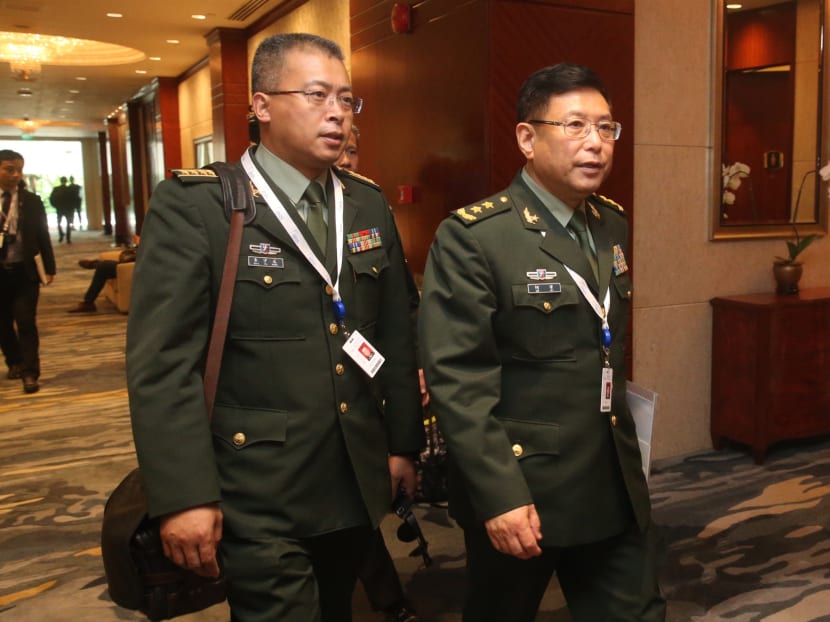China upholds rules-based order, says Chinese general in response to US
SINGAPORE — China supports and upholds the international rules-based order, said the head of the Chinese delegation at the Shangri-La Dialogue (SLD) on Saturday (June 3), in a direct response to America’s criticism that the Asian giant disregards international law.

Lieutenant-General He Lei (right), who attended the Shangri-La Dialogue (SLD) in Singapore on Saturday (June 3). Photo: Ooi Boon Keong/TODAY
SINGAPORE — China supports and upholds the international rules-based order, said the head of the Chinese delegation at the Shangri-La Dialogue (SLD) on Saturday (June 3), in a direct response to America’s criticism that the Asian giant disregards international law.
“China and the Chinese government are a protector and follower of international and regional rules,” Lieutenant-General He Lei told reporters, citing how China was one of the first countries to sign up to the
United Nations charter and that over the years, Beijing has entered into its more than 23,000 bilateral agreements and over 400 multilateral agreements.
“China can be said to be following, supporting and safeguarding the international and regional order,” he added.
“But how to understand these rules?” said Gen He, who is Vice President of the Chinese army’s Academy of Military Sciences.
“We think international rules should represent the interest of most of the countries and be recognised by these countries. And regional rules should represent the interest of the majority of the countries of the region.”
He cited the signing of a Declaration of Conduct of Parties in the South China Sea between China and the Association of South-east Asian Nations in 2002 as an example of this, as well as the recent conclusion of a framework for a Code of Conduct in the disputed waters by the two sides.
His comments came hours after United States’ Defence Secretary James Matthis rebuked China’s militarisation of islands in the South China Sea, saying at a plenary session at the SLD that Washington “cannot and will not accept unilateral, coercive changes to the status quo”.
He said China’s construction activities in the South China Sea differed from those of other countries in several key areas.
“This includes the nature of its militarisation, China’s disregard for international law, its contempt for other nations’ interests and its efforts to dismiss non-adversarial resolution of issues,” said Mr Mattis.
He added that the US would “demonstrate resolve” by continuing to fly, sail and operate wherever international law allows.
But Lt-Gen He countered that countries which send naval vessels to waters and military jets to airspace close to China’s islands to carry out surveillance and military activities are not acting in accordance with the principles of freedom of navigation.
“The Chinese government and its people are firmly opposed to it,” he said, although he did not refer to any countries in particular.
In late May, a United States navy warship conducted a freedom of navigation drill near Mischief Reef in the disputed Spratly Islands. The manoeuvre, the first under the Trump administration, prompted an angry response from Beijing.
In the same week, China denied the Pentagon’s charge that an encounter between Chinese fighters and a US surveillance plane over the South China Sea was “unsafe and unprofessional”.
Like Gen Mattis earlier in the day, Lt-Gen He did seek to strike a balance in his remarks, saying that bilateral ties between the two powers affect global and regional security.
“China values and treasures its relationship with the US,” he said, noting that Presidents Xi Jinping and Donald Trump had a good summit in Florida in April.
“I believe that if China and the US abide by the principles of non-confrontation, mutual respect and win-win cooperation, and strengthen mutual trust and crisis and risk control, then there will be more room for cooperation,” he said.
“That way, both sides can contribute greatly to global and regional peace and security.”
Mr Mattis had earlier said that Washington wants to work closely with Beijing where they have common cause and that a stable relationship between the two superpowers is vital to global stability and prosperity.
Lt-Gen also spoke at a SLD discussion on new patterns of security cooperation later in the afternoon, where he wanred that while the situation in Asia-Pacific is generally safe and positive, “hotspot issues” could flare up.
“The nuclear issue on the Korean Peninsula keeps fermenting and remains complicated and unresolved,” he said.
“Individual countries maintain their security through exclusive military alliances, base their security on other countries’ insecurity and do not hesitate to stir up conflict and provoke trouble.”
He said that all countries should settle disputes in peaceful manner instead of resorting to force, adding that China adopts a foreign policy based on peace and takes the lead in security building in the region.
He also sought to allay worries over the growing might of the Chinese military, saying that the Asian giant is committed to resolve international disputes through peaceful negotiations, and is thoroughly opposed to resorting the use of force or threat of force.









